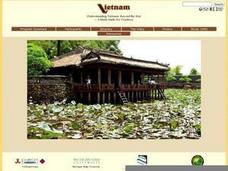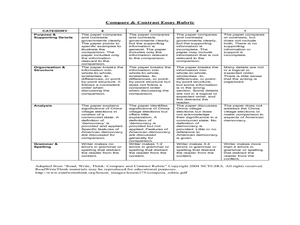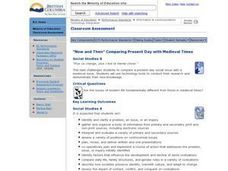Curated OER
Lincoln, Douglass, and Black Emergence (Literature and Politics, 1840-1865)
Students examine the ideas of Lincoln and Douglass. In groups, they compare and contrast writings from each man and how they formed the nation with their ideas. After watching "Glory", they discuss how people like Lincoln and Douglass...
National Endowment for the Humanities
Factory vs. Plantation in the North and South
North is to factory as South is to plantation—the perfect analogy for the economy that set up the Civil War! The first lesson in a series of five helps teach beginners why the economy creates a driving force for conflict. Analysis of...
Curated OER
Crystal Blue Persuasion
Students examine historic posters, jewelry, quilts and buttons that were created to protest or call attention to a political issue. After evaluating how these items were used to communicate a political message, students create an item...
Curated OER
Representation: Elections
Students study and examine how elections are conducted in Australia. In this representation lesson plan, students make comparisons regarding systems of voting. Students explore the three levels of government and discuss federal...
Curated OER
Population Diversity in Southeast Asia
Students explore diversity in ethnic, lingual, religious, and political systems of the people of Southeast Asia. The instructional activity's focus is designed to foster an understanding of the complexity of the region.
Curated OER
Understanding Communism Past and Present
Students can learn about communism by exploring the countries where this political system was established.
Curated OER
Mr. Yamada’s Tips for Success on Current Events Commentary: Macroeconomics
In this economic systems worksheet, students read and follow the provided 5 tips to locate, analyze, and discuss macroeconomics current event issues.
Curated OER
Analyzing the economic, political, social, and cultural transformation of the United States since World War II
Eleventh graders examine political issues in the United States between 1936 and 2000. In this American history lesson, 11th graders study the economy, education, government, civil rights, and sports of this time period. Students compare...
Curated OER
Confederation Comparison
Students compare and contrast American and Canadian plans for government. In this government lesson, students analyze the text and impact of the Articles of Confederation and the Confederation of Canada. Students compose essays that...
Curated OER
Canada Arrives in a Splash of Color
Students investigate social and political issues surrounding founding of Canada and compare their relevance to Canada today, interpret art works representing Canada's past identity and compare that identity to how Canada is perceived...
Curated OER
Cartoons in the Classroom: Castrophe Cartoons
In this current events worksheet, students analyze political cartoons about catastrophes. Students respond to 3 talking point questions.
Curated OER
Push/Pull factors in Immigration
Students explore the push/pull factors experienced by immigrant families. They interview a parent and an American about their family's immigration history. Students write a summary of the interview and compare the push/pull factors of...
Curated OER
Comparing the House and Senate
Students create posters and write descriptions on the responsibilities and powers assigned to the United States Senate and House of Representatives. Students compare and contrast the two houses' powers and responsibilities as well as...
Curated OER
Tiananmen Square
Young scholars identify and explain the Tiananmen Square incident of June 1989.
Studentsl compare what it is to be an American Citizen (Democracy) vs.
Chinese Citizen (Communism). Young scholars identify and define various vocabulary...
Curated OER
A Brief History of Vietnam (1858-2004) and Its Evolving Communist System
Students examine the French colonization of Vietnam, the Vietnam War, and the current evolving Communist system. They develop political maps, outline the major events of the Vietnam War, write an essay, and compare/contrast democracy...
Curated OER
Democratic Village Elections in China: Comparing Governments of China and the United States
Students explore democratic practices in China. In this global studies lesson, students compare and contrast democratic values of the Chinese government with the American government. Students read provided articles and conduct their own...
Curated OER
"Now and Then" Comparing Present Day with Medieval Times
Eighth graders compare a present-day social issue with a medieval issue. They use technology tools to conduct their research and demonstrate their new knowledge. Students present their findings to the class in the form of a PowerPoint.
Curated OER
Comparing Creation Stories
Students compare and contrast creation stories in different cultures. They write a creative story and design a visual aid showing what their new civilization would look like.
Curated OER
Michigan Judicial System Conclusion
Young scholars identify the courts that make up Michigan's judicial system. They state the responsibilities of each court and diagram a flow chart of how a case moves to the Michigan Supreme Court. They participate in a quiz about the...
Curated OER
Voting Systems
Students view many viewpoints on Britain's voting systems. Students compare/contrast various forms of electoral systems. Students trace the steps to proportional representation.
George Washington's Mount Vernon Estate & Gardens
George Washington: Centerpiece of a Nation
A neat Presidents Day activity, this lesson plan provides a culminating learning experience for upper elementary aged learners. After analyzing George Washington's, "A Display of the United States of America," your learners will conduct...
University of Pennsylvania
Mock Trial of Alfred Dreyfus
What if scholars based mock trials on history? The fourth installment of a five-part series on the Dreyfus Affair asks learners to read various pieces of evidence before conducting a mock trial for a French officer. Teams answer...
Roy Rosenzweig Center for History and New Media
George Washington: General, President, Slave Owner
Times change; behaviors that were once considered acceptable can be seen in a very different light. Middle schoolers revisit the legacy of George Washington in a three-day lesson plan that uses primary sources to reveal Washington as a...
Curated OER
Government Lesson Plan: Lesson Plan 9
Young scholars examine and compare/contrast the steps of criminal and civil cases. They define key vocabulary terms, develop an outline of a criminal and civil trial, and analyze the differences in standards of proof in legal cases.

























